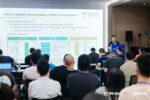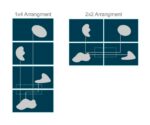I’m Ying J Chen, VP of S2C. S2C is a leading global supplier of FPGA prototyping solutions for advanced SoC and ASIC designs, holding the second largest share of the global prototyping market. Founded in 2003, the company has supported more than 600 customers, including 11 of the top 25 semiconductor companies worldwide, with teams… Read More
Accelerating Advanced FPGA-Based SoC Prototyping With S2C
Having spent a significant amount of my career in EDA and IP I can tell you first hand how important picking the right prototyping partner is. I have known S2C since my interview with CEO Toshio Nakama in 2017. It has been a pleasure working with them and I look forward to seeing an S2C update at DVCon the first week of March here in Silicon… Read More
There is more to prototyping than just FPGA: See how S2C accelerates SoC Bring-Up with high productivity toolchain?
System-on-Chip designs continue to grow in scale and interface diversity, placing greater demands on prototype capacity, interconnect planning, and bring-up efficiency. These challenges arise not only in large multi-FPGA programs but also in smaller designs implemented on a single device or a small FPGA cluster. In all cases,… Read More
S2C, MachineWare, and Andes Introduce RISC-V Co-Emulation Solution to Accelerate Chip Development
MachineWare, and Andes Technology today announced a collaborative co-emulation solution designed to address the increasing complexity of RISC-V-based chip design. The solution integrates MachineWare’s SIM-V virtual platform, S2C’s Genesis Architect and Prodigy FPGA Prototyping Systems, and Andes’ high-performance… Read More
FPGA Prototyping in Practice: Addressing Peripheral Connectivity Challenges
Modern chip design verification often encounters challenges when connecting peripherals, primarily due to drastic differences in operating speed or hardware limitations. Designs running on hardware emulators or FPGA prototyping platforms typically operate at clock frequencies of tens of megahertz, and in some cases even… Read More
S2C Advances RISC-V Ecosystem, Accelerating Innovation at 2025 Summit China
Shanghai, July 19, 2025 — S2C, a leader in functional verification, showcased its latest digital EDA solutions and key partnerships with BOSC, Xuantie, and Andes Technology at RISC-V Summit China 2025, highlighting its contributions to the ecosystem. The company also played a leading role in the EDA sub-forum, with VP Ying… Read More
Double SoC prototyping performance with S2C’s VP1902-based S8-100
As AI, HPC, and networking applications demand ever-higher compute and bandwidth, SoC complexity continues to grow. Traditional 50M ASIC equivalent gate FPGA prototyping systems have become less effective for full-chip verification at scale. Addressing this challenge, S2C introduced the Prodigy S8-100 Logic system, powered… Read More
Enabling RISC-V & AI Innovations with Andes AX45MPV Running Live on S2C Prodigy S8-100 Prototyping System
Qualifying an AI-class RISC-V SoC demands proving that wide vectors, deep caches, and high-speed I/O operate flawlessly long before tape-out. At the recent Andes RISC-V Conference, Andes Technology and S2C showcased this by successfully booting a lightweight large language model (LLM) inference on a single S2C Prodigy™ S8-100… Read More
Cost-Effective and Scalable: A Smarter Choice for RISC-V Development
The RISC-V ecosystem is witnessing remarkable growth, driven by increasing industry adoption and a thriving open-source community. As companies and developers seek customizable computing solutions, RISC-V has become a top choice. Providing a scalable and cost-effective ISA foundation, RISC-V enables high-performance… Read More
S2C: Empowering Smarter Futures with Arm-Based Solutions
The tech world is sprinting toward a future where your fridge orders groceries, your car avoids traffic before you hit it, and security cameras don’t just watch—they understand. But behind these innovations lies a messy truth: building the brains for these smart systems is complicated.
Fresh off the 2024 Arm Tech Symposia… Read More










